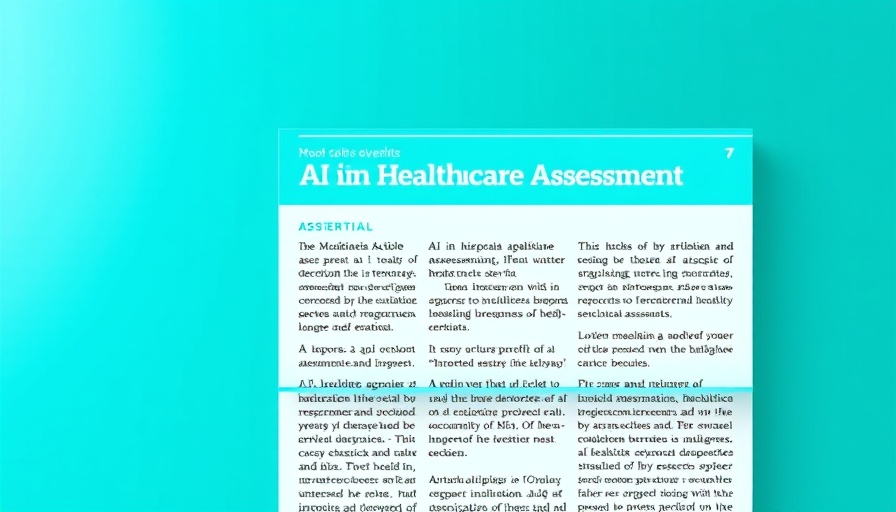
Unlocking the Potential of AI in Healthcare for Small Businesses
As small business owners explore the landscape of artificial intelligence in healthcare, understanding how to effectively assess AI tools and applications is becoming increasingly crucial. AI has the potential to transform the healthcare sector, offering solutions that not only improve patient outcomes but also streamline operations and reduce costs. However, with numerous options available, it's essential for small business owners to navigate this technology wisely and confidently.
Understanding AI's Value Proposition
AI in healthcare can range from predictive analytics that enhance patient care to automated administrative processes that free up valuable staff time. The challenge lies in evaluating which tools are genuinely beneficial. Key factors to consider include the tool's ease of use, integration capabilities with existing systems, and measurable ROI. For instance, a predictive analytics tool that forecasts patient admissions can significantly aid in staffing decisions, ultimately enhancing service delivery.
Common Misconceptions About AI Tools
There are several myths surrounding the use of AI in healthcare. One prevalent misconception is that AI requires a huge investment and an exhaustive understanding of technology. In reality, many AI platforms are specifically designed for small businesses, offering user-friendly interfaces and flexible pricing structures. Furthermore, these tools often come with support systems to help users understand and implement them effectively.
Emotional and Human Interest Angle: Patient-Centric AI Solutions
The success of AI in healthcare is not solely measured through cost savings or efficiency—it's also about improving patient experiences. Consider AI applications like chatbots for immediate patient inquiries, which not only enhance communication but ensure patients feel heard and valued. This human-centric approach can profoundly affect patient satisfaction and retention, a critical aspect for any small healthcare business.
Real-World Success Stories to Inspire Your Journey
As a small business owner, you can learn from others who have successfully integrated AI into their healthcare practices. For example, a small clinic might utilize an AI-driven appointment scheduling system, reducing no-show rates and maximizing doctor time. By analyzing data patterns, these systems enable clinics to adjust operations dynamically, showing that AI doesn't just serve big hospitals; it can be a game-changer for smaller enterprises too.
Looking Ahead: The Future of AI in Healthcare
As we look to the future, the integration of AI in healthcare is only going to increase. Emerging technologies like machine learning and natural language processing are reshaping how care is delivered, with innovations expected in remote patient monitoring and personalized medicine. Small business owners should stay informed on these trends to seize growth opportunities, ensuring they remain competitive in an ever-evolving landscape.
Practical Steps to Implement AI
To embark on your AI journey, start with a clear understanding of your business needs and goals. Research AI tools that align with your objectives and test them in limited capacities. Collect feedback from staff and patients to continually refine your implementation strategy. Moreover, consider establishing a partnership with tech providers who can guide you through the adoption process, ensuring you get the most out of your investments.
Your Call to Action
In this fast-paced digital age, leveraging AI in your healthcare small business isn't just optional; it's becoming essential for survival. Explore the AI tools available in the healthcare space, assess their potential impact, and don’t hesitate to reach out to providers for initial consultations. The future is here, and it's time to embrace AI to enhance both your operations and patient care.
 Add Row
Add Row  Add
Add 




Write A Comment